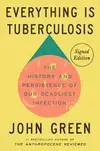
Eduardo Santiago

Yes, TB is still a thing. Or is it? On the one hand, over one million people die of it each year and millions more suffer. On the other, most of those millions have skin which is high in melanin. Should we care? John Green, along with health professionals all over the world and countless humans, make a convincing case that we should; attorneys representing the Johnson & Johnson corporation, and a few other members of class Republicania I mean Reptilia, argue otherwise. Who's to say who's right?
Green is perhaps the best person to tackle this difficult subject, to make it accessible, and he's done so. His narrative weaves between tragic single deaths and the incomprehensible mind-numbing statistical millions, and he does so in a way that boosts our compassion for all and our anger at the systems that enable these injustices. I admire how he upends germ theory, asserting that TB is not in fact caused by Mycobacterium tuberculosis but by malnutrition, poverty, and stress. Billions of us carry the bacillus, asymptomatic: it's when we suffer that the disease manifests, in turn begetting more suffering. Fiendish. (I don't mean the bug, I mean the human greed that keeps us from responding to this suffering). It was chilling to read this book so soon after Kinship Medicine: so many common threads, so many shared frustrations.
I don't read many white-male authors these days, but Green is a noble exception. He demonstrates compassion and humility and is using his talent for good. Not quite five stars, but am rounding up because of the human importance of this work.
Yes, TB is still a thing. Or is it? On the one hand, over one million people die of it each year and millions more suffer. On the other, most of those millions have skin which is high in melanin. Should we care? John Green, along with health professionals all over the world and countless humans, make a convincing case that we should; attorneys representing the Johnson & Johnson corporation, and a few other members of class Republicania I mean Reptilia, argue otherwise. Who's to say who's right?
Green is perhaps the best person to tackle this difficult subject, to make it accessible, and he's done so. His narrative weaves between tragic single deaths and the incomprehensible mind-numbing statistical millions, and he does so in a way that boosts our compassion for all and our anger at the systems that enable these injustices. I admire how he upends germ theory, asserting that TB is not in fact caused by Mycobacterium tuberculosis but by malnutrition, poverty, and stress. Billions of us carry the bacillus, asymptomatic: it's when we suffer that the disease manifests, in turn begetting more suffering. Fiendish. (I don't mean the bug, I mean the human greed that keeps us from responding to this suffering). It was chilling to read this book so soon after Kinship Medicine: so many common threads, so many shared frustrations.
I don't read many white-male authors these days, but Green is a noble exception. He demonstrates compassion and humility and is using his talent for good. Not quite five stars, but am rounding up because of the human importance of this work.